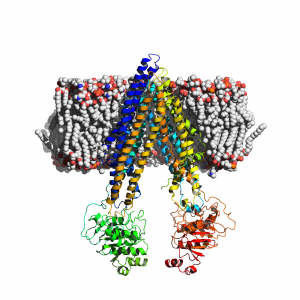Today two of our pharmacology titles within the BMC series, BMC Pharmacology and BMC Clinical Pharmacology, are joining forces to form BMC Pharmacology and Toxicology. Our aim is to facilitate connections between pre-clinical and clinical research, especially in this era of translational medicine. The new journal has an expanded scope to incorporate the interdisciplinary field of toxicology. You can read more about our aims in this Editorial.
“I think the merger is an excellent idea, especially since the borders between pharmacology, clinical pharmacology and toxicology can be rather ‘blurry’ and because of clinical and translational sciences being a major effort in the US and elsewhere.”
Paul Insel, University of California, Editorial Board Member.
Ironically, the subject matter of BMC Pharmacology and Toxicology was brought home to one of us [EM] by a recent bout of childhood illness in the shape of chickenpox. Not only was she thankful for the drugs that set the children on the road to recovery – paracetomol (otherwise known as acetaminophen), a widely used pain reliever and fever reducer; antihistamine, a histamine antagonist that blocks the action of histamine and calms the itchy blisters; and antibiotics, chemicals used to treat bacterial infection, she realised her naivety about the clinical knowledge underpinning the use, dose, efficacy, delivery and toxicity of various drugs. Ibuprofen for example, an otherwise medical cabinet standby, isn’t recommended for treating fever in chickenpox as it has been associated with more severe secondary infections.
Thankfully, BMC Pharmacology and Toxicology is in the safe hands of our external academic Editorial Board. They welcome manuscripts on all aspects of chemically defined therapeutic and toxic agents from all fields of experimental and clinical pharmacology including clinical trials. The journal is divided into subject-specific sections overseen by expert external Section Editors allowing authors to submit to a particular section and allowing readers to browse articles in a given section of interest.
The sections and Section Editors are:
Basic Pharmacology – David Farb
Clinical Pharmacology – Piero Olliaro
Computational, in silico and modeling studies – Philip Biggin
Drug design, discovery and delivery – Giorgio Palu
Toxicology – Michael Aschner and Lucio Costa
The journal will operate an open-peer review policy which is a refreshing and bold step in a field with high levels of sponsorship from the pharmaceutical industry.
The journal launches with a review article by Terry Kenakin in which he focuses on the potential for selective pharmacological therapies given that not all agonists uniformly activate signaling pathways. Amongst the other launch articles, Philip Biggin gives his personal view on the key issues in the field of computational, in silico and modeling studies in the first of a series of interviews with our Section Editors.
It’s difficult to imagine life without the availability of pain killers and medicines that frequently come to our aid and the journal fills an important niche in disseminating research carried out in these areas. We do hope that you will take the time to visit BMC Pharmacology and Toxicology and consider us for your future submissions.
Our grateful thanks to the Editorial Boards of BMC Pharmacology and BMC Clinical Pharmacology for their vital support over the past years, and our colleagues at BioMed Central for all their help during this merger.
Christopher Morrey PhD
Executive Editor, BMC Pharmacology and Toxicology
Genevieve Horne
Journal Development Manager, BMC series
Elizabeth Moylan PhD
Biology Editor, BMC series
One Comment